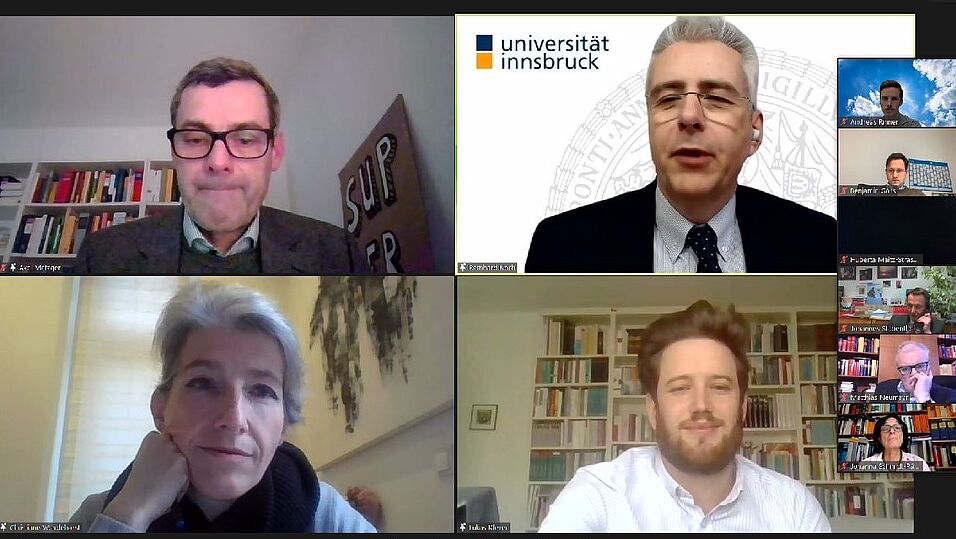The Austrian Hub was re-launched under the initiative of Professor Susanne Augenhofer, Professor Walter Doralt and Professor Christian Koller.
Participants discussed the Directive concerning contracts for the sale of goods (Sale of Goods Directive) and the digital content and digital services Directive (Digital Content Directive), which are requiring the legislator to push for reforms in the field of Consumer Law.
Participants were welcomed by the president of LFU Innsbruck, Professor Tilmann Märk, as well as Professor Doralt and ELI President Christiane Wendehorst on behalf of ELI.
Professor Johannes Stabentheiner from the Austrian Federal Ministry of Justice started the Conference by introducing the Austrian draft for the implementation of the Digital Content Directive, followed by Dr Benjamin Görs from the German Federal Ministry of Justice and Consumer Protection who presented the German draft as well as the legislative process. One difference was highlighted: while the German legislator plans to adapt the German Civil Code to the requirements of the Directives, the Austrian legislator plans to enact a new ‘Consumer Warranty Act’ to implement the Directives. During the Conference, the speakers argued both for and against the Austrian approach.
Professor Bernhard Koch from the University of Innsbruck and Professor Stephan Lorenz from the Ludwig Maximilian University of Munich focused on the implementation of the Sale of Goods Directive. Professor Koch explained the Austrian choice to enact a special law in order to implement the Directive. Besides, he highlighted some provisions such as extending the shift in the burden of proof as well as implementing the guiding principles established in the Weber/Putz (C-65/09 and C-87/09) decision by the Court of Justice of the European Union (CJEU).
Professor Stephan Lorenz focused on the Directive’s consequences for maintaining an adequate level of private autonomy for B2B transactions in German Law. As warranty law mostly does not distinguish between B2C and other forms of transactions, it is crucial to balance consumer and business interests.
In the following part of the Conference, the Austrian and German drafts for the implementation of the Digital Content Directive were presented. Professor Wendehorst from the University of Vienna presented some core features of the current working draft prepared by the Austrian Ministry of Justice. She expressed her approval of the decision to implement the Directive in a separate Consumer Warranty Act (and not in the Civil Code), at the same time warning against legal fragmentation, in particular as the current draft still leaves some important provisions in the Civil Code and in the Consumer Code. Professor Wendehorst however expressed her regret that the current approach is not very ambitious in terms of policy decisions made, refusing to address issues such as the effects that withdrawal of consent to data processing has on the contract, let alone more controversial decisions such as direct producer liability.
Seeing the need of a regulation of digital content and digital services, Professor Alexander Metzger from the Humboldt University Berlin praised the German draft. Though he would have preferred an implementation by creating a new type of contract in the special part of law of obligations, he welcomed the proposal as an ‘arena in which jurisprudence and literature can work out the details’.
Afterwards, Professor Augenhofer from the University of Innsbruck compared the Austrian and German drafts. She expressed, inter alia, her concern regarding the Austrian approach to impose another special stature in the area of consumer law.
The Conference was concluded by a panel discussion with Dr Petra Leupold from the Austrian Association for Consumer Information (Verein für Konsumenteinformation) and Johannes Kepler University Linz, Jutta Gurkmann from the Federation of German Consumer Organisations (vzbv), Huberta Maitz-Strassnig from the Austrian Chamber of Economy (Wirtschaftskammer Österreich), Professor Matthias Neumayr, vice-president of the Austrian Supreme Court, and Professor Johanna Schmidt-Räntsch from the German legislator.
Finally, the organisers Professor Augenhofer and Professor Koch pointed out that the many still open questions can be discussed at the next year’s Conference, which will hopefully take place physically on 26 November 2021.

